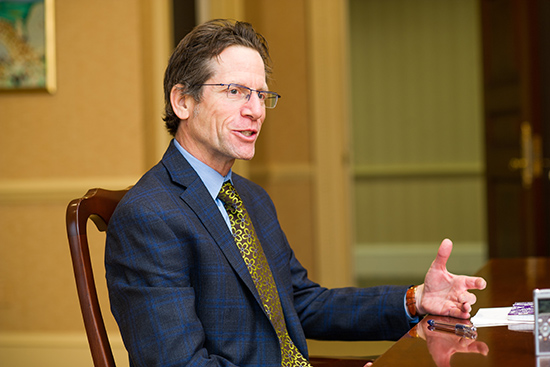New Graduate Affairs Chief Looks for Creative Approaches
Sees need for interdisciplinary study, course scheduling flexibility

Collaboration across boundaries will be key to success in our increasingly complex world, says Daniel Lee Kleinman, BU’s new associate provost for graduate affairs. Photo by Cydney Scott
Collaboration across boundaries will be key to success in our increasingly complex world, says Daniel Lee Kleinman, BU’s new associate provost for graduate affairs. Kleinman, who arrives from the University of Wisconsin–Madison, where he was a professor of community and environmental sociology and senior associate dean in the graduate school, knows from experience that knowledge doesn’t necessarily follow disciplinary lines. “I’m a social scientist,” he says. “And I collaborated with an entomologist on a book about the crisis facing honeybees.”
Vanishing Bees: Science, Politics, and Honeybee Health (Rutgers University Press, 2016), cowritten with biologist Sainath Suryanarayanan, explores colony collapse disorder and what happens when stakeholders, from farmers to federal agencies, do not see eye-to-eye. (Listen to the coauthors on National Public Radio.)
At Wisconsin, Kleinman spearheaded an initiative that brought together faculty members from different fields to train students who were also from different fields. One such project, which focused on the history of China, involved historians, art historians, and literary scholars working together to cross-train the students.
“For students at the PhD level, it’s still probably the case that you need a degree that has a disciplinary name attached to it,” says Kleinman, who is also a College of Arts & Sciences professor of sociology. “Getting broader interdisciplinary training is likely to make you a more innovative scholar.”
He has also led initiatives to develop multiyear support packages for the interdisciplinary training of graduate students, to bolster recruitment by increasing the flexibility of graduate fellowships, and to broaden leadership and professional development opportunities for graduate students.
As associate provost for graduate affairs, Kleinman is the senior officer reporting directly to the University provost with responsibility for issues in graduate education. He will lead the university’s initiatives in graduate education and the Graduate Council and will also work closely with the Graduate and Professional Student Leadership Council. In addition, Kleinman will serve as a member of the provost’s cabinet and the University Council.
“We are excited to welcome Daniel to BU and have enormous confidence in his vision and ability to drive excellence in graduate education across the University,” says Jean Morrison, University provost and chief academic officer. “He brings a breadth of knowledge and experience to this role, from convening important discussions across disciplines around graduate learning and assessment, PhD education, and new program development to recruiting and retaining increasingly diverse graduate student populations. BU is in an excellent position right now to make substantive progress in the quality and stature of our graduate programs, and we believe that Daniel has the right set of skills, instincts, and interpersonal attributes to lead these efforts.”
Boston University is focusing attention on growing master’s programs at a time when master’s degrees are going to be increasingly needed. “The economy is changing,” Kleinman says, “and people will have not just several jobs over the course of their lifetimes, but several careers.” He believes that successful careers will require not just on-the-job training, but also postbaccalaureate education, perhaps going back to school multiple times. That means master’s programs will need to accommodate working people with online courses or hybrids.
For PhD students, he says, the higher-education job market seems to be shrinking, which means there is a need to define nonacademic career paths. That’s not only in STEM (science, technology, engineering, math) fields, where long-term nonacademic careers are relatively common, but also for the arts and humanities. “In engineering, lots of people go into industry, and in biomedical, some people do as well, but opportunity should be open to everybody,” he says.
He also plans to work with the schools and colleges to increase the population of underrepresented minorities in graduate programs, perhaps by redesigning recruitment, admission, and retention efforts. “For students who are first generation or whose background might not include a cultural understanding of the university setting, having an infrastructure to support them is really important,” he says. “That may require different kinds of mentoring, social events—whatever can build community.”
His other goals include increasing flexibility in the ways dissertations are presented, beyond the standard 300-page Word document, given changes in technology and in the job market.
Kleinman has a BA in social history from Haverford College and an MS and a PhD in sociology from the University of Wisconsin–Madison. Before joining the Wisconsin faculty, he held faculty positions at the Georgia Institute of Technology and the University of Houston, Clear Lake.
Although Kleinman grew up in Santa Monica, Calif., his lawyer father is from Newton, Mass. His wife, Susan Bernstein, formerly a Wisconsin professor of English, has written on Victorian literature and women’s studies, and is now a CAS adjunct professor of English.

Comments & Discussion
Boston University moderates comments to facilitate an informed, substantive, civil conversation. Abusive, profane, self-promotional, misleading, incoherent or off-topic comments will be rejected. Moderators are staffed during regular business hours (EST) and can only accept comments written in English. Statistics or facts must include a citation or a link to the citation.